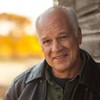Cultural Leprosy
Just when you thought our culture couldn’t get any crazier, we now have a 47-year-old father of seven who wants to be identified as a six-year-old girl.
But the really crazy thing is that our culture is gushing over him.
Why? Well, it’s primarily because of the Covenant of Tolerance, where we discard the notion of absolute, transcendent Truth, substitute the individual as it’s source, and then affirm each other’s absolute right to follow our heart. The Covenant then says that I will affirm you if you will affirm me.
And we are going to affirm ourselves into a cultural abyss.
By affirming the increasingly absurd, we are hoping that we will, in turn, be affirmed in our own absurdity, our own self-centered desires…so that nothing can be denied us…no desire, no want, no need…absolutely nothing can be called into question because there is no absolute truth, only individual truth. And the Covenant assures that we will affirm each other...a solidarity of self-centeredness, if you will.
This leads us to see pathology as healthy, selfishness as praiseworthy, and evil as individual righteousness.
This is cultural leprosy.
We can no longer feel pain--a natural sense of danger; no longer feel when our hand is on the hot stove; no longer hear or see the warnings of lies and evil. We have made a Covenant to hear no wrong, see no wrong, speak that there is no wrong.
Cultural leprosy will lead to death. Over time, each evil and lie that we close our eyes and ears and voices to, kills another part of our culture until we become the walking dead. We may still exist, but as a culture, we are dead. We will have literally destroyed ourself through selfish stupidity.
So now we applaud Paul Woscht, ('please call me Stefonkee'), who has left his wife and family and has been embraced by an affirming Covenant family who has taken him in as a 6-year-old girl. He dresses in dresses and colors and no doubt plays house with his new “mummy and daddy’s” grandchildren.
And to call this insane or deranged, demented or loony, or just plain sinful to abandon one's family for selfish desire, is to be called hateful, bigoted, narrow-minded, and trans-phobic.
Because we have become cultural lepers.
I would call you again, Remnant, to join together to pray for repentance, Tuesday, noon eastern. Put it on your calendar. Pray that the Lord would strike us all with repentance that we might come to our senses and escape from the trap of the devil who has taken us captive to do his will.
And the Lord’s servant must not be quarrelsome but must be kind to everyone, able to teach, not resentful. Opponents must be gently instructed, in the hope that God will grant them repentance leading them to a knowledge of the truth, and that they will come to their senses and escape from the trap of the devil, who has taken them captive to do his will. 2 Timothy 2:24-26
Related Content




Comments